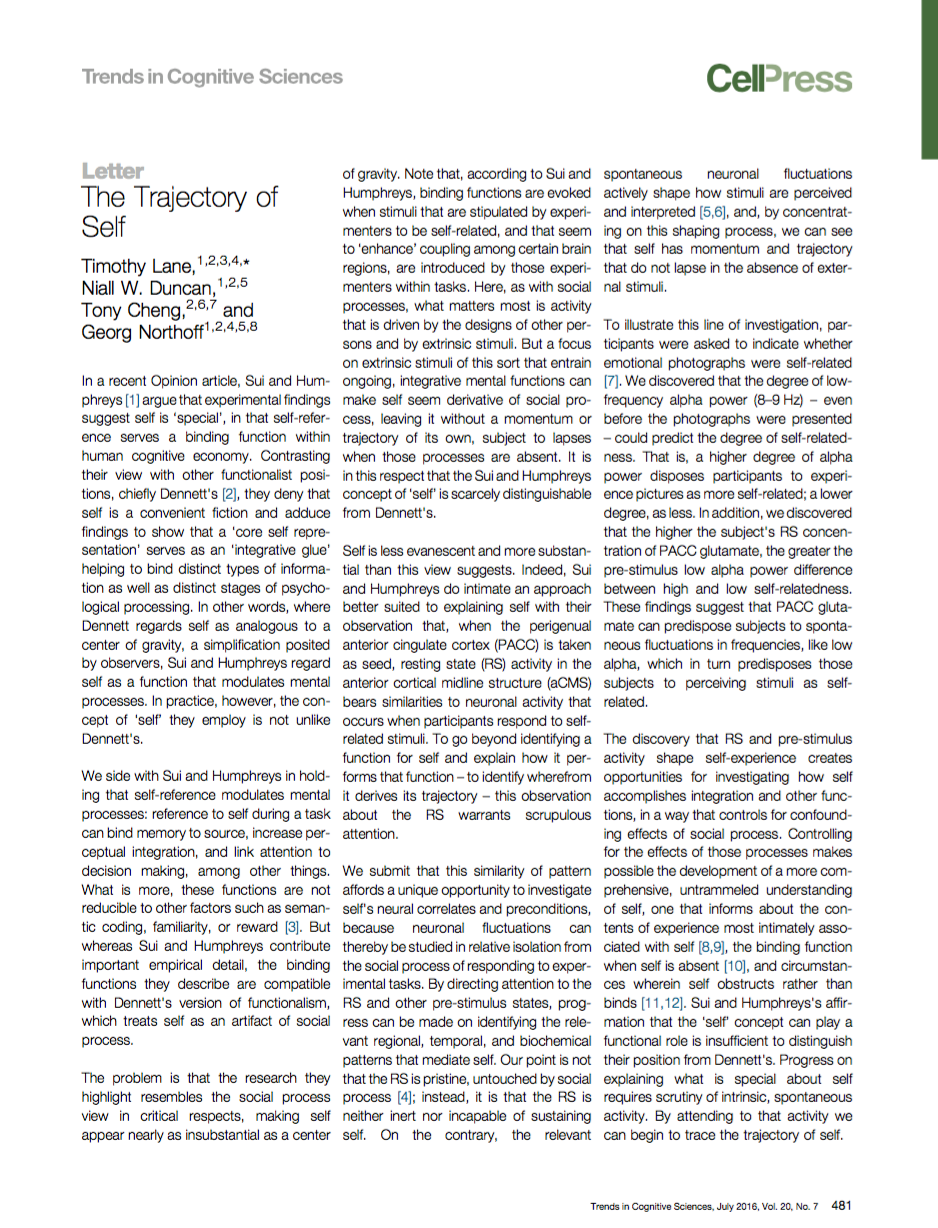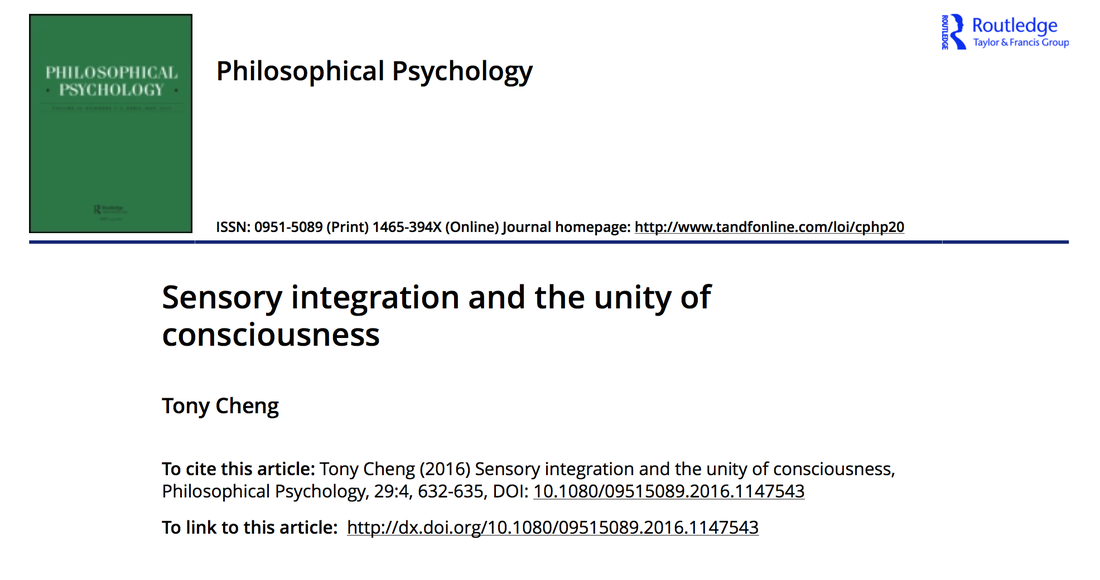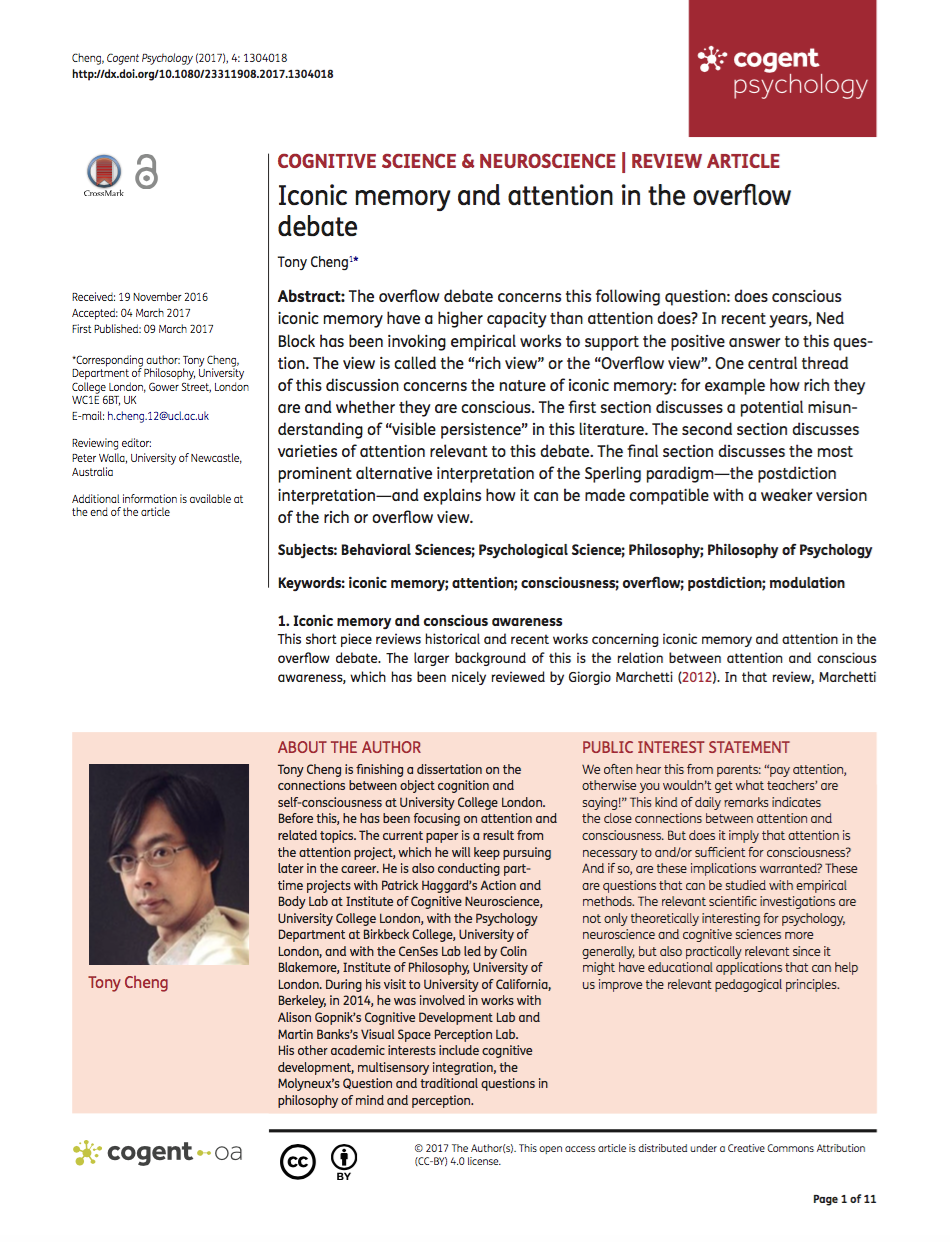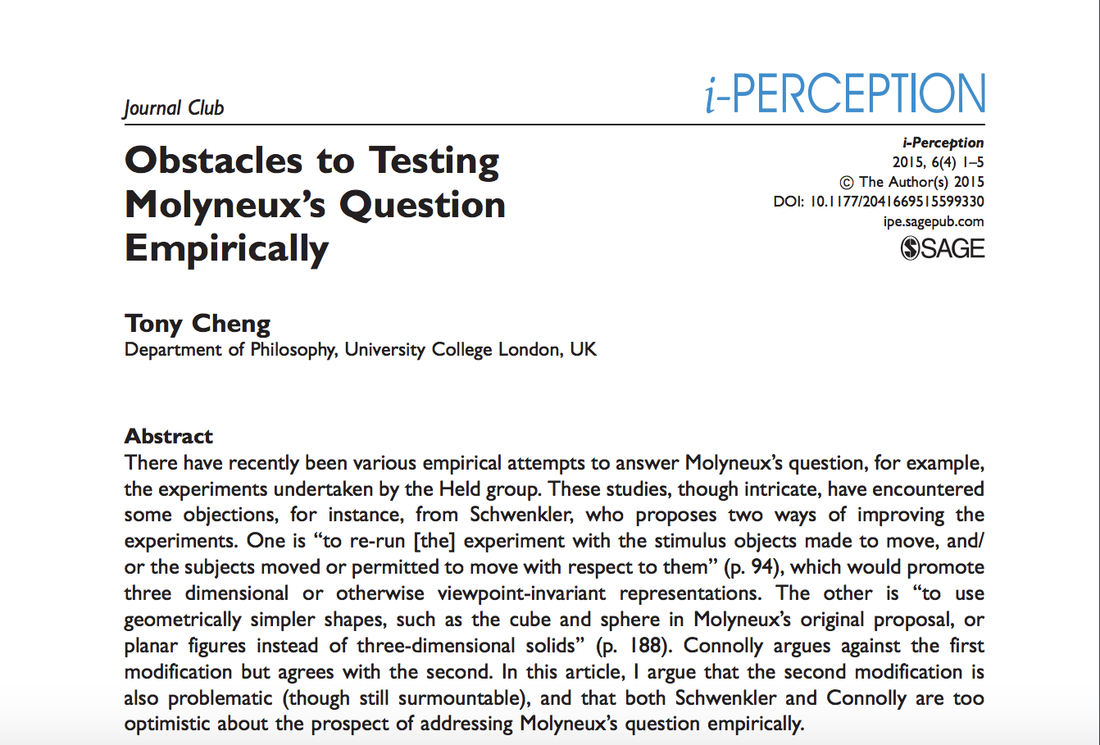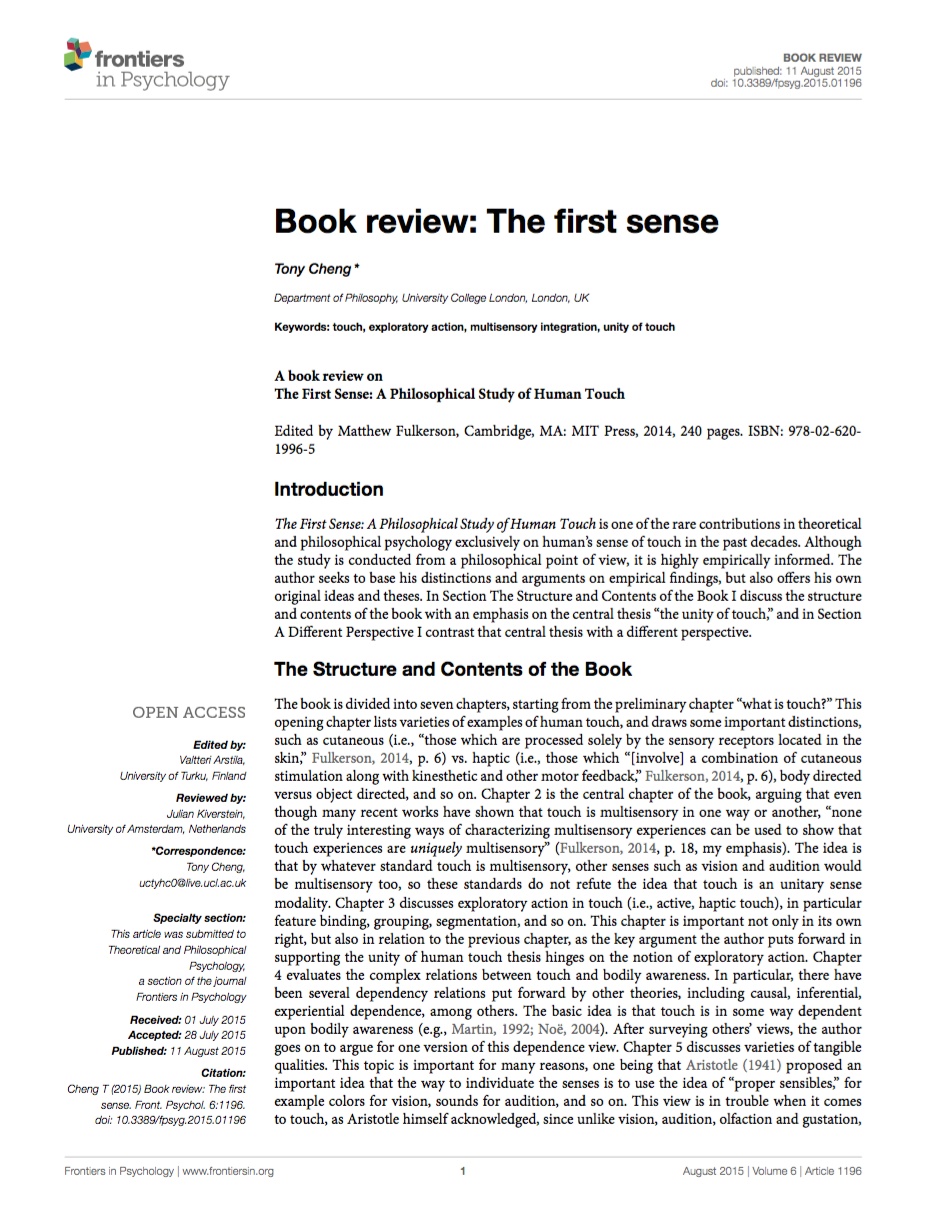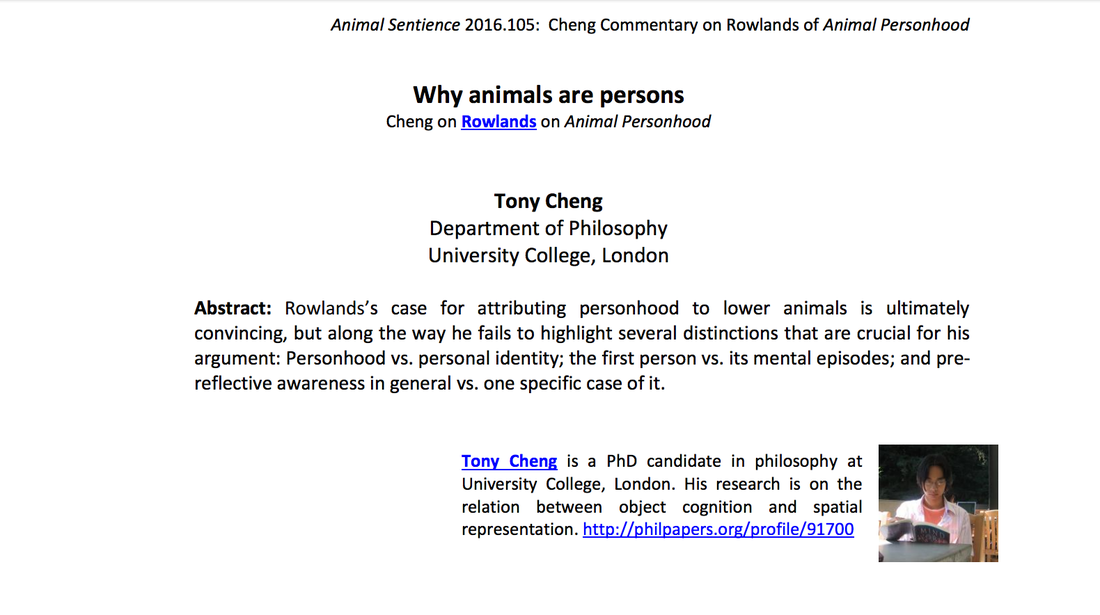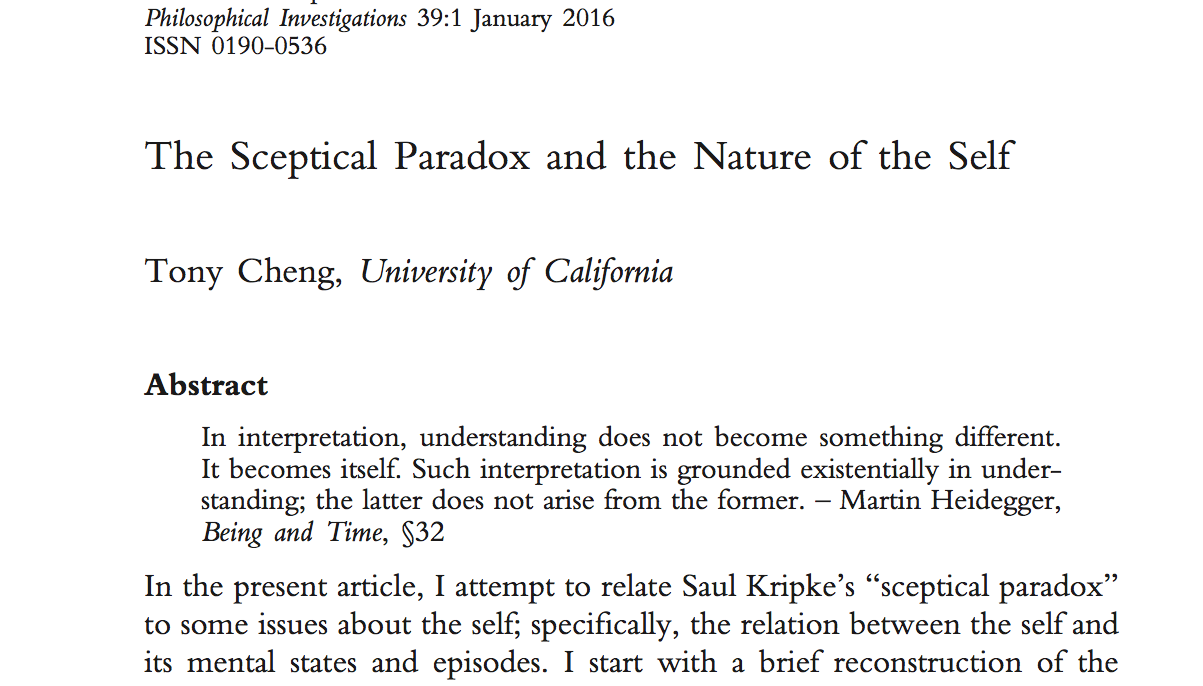Projects.
|
In recent years I work on four projects; the first two are empirical and the others are transcendental. (I do not update this page frequently.) 1) Tactile Field P. F. Strawson (1959) famously argues that though there is a clear sense of the visual field, there is no such analogous sensory field in touch. Brian O'Shaughnessy (1989) and M. G. F. Martin (1992) follow his lead. They emphasise the fact that the spatiality of touch is derived from proprioception, kinesthesia, temporal perception, and vision. With Patrick Haggard and colleagues, I have been attempting to meet this significant challenge. We conduct experiments showing that there is some basic spatiality of touch that is not derived from other modalities (F. Fardo, B. Beck, T. Cheng, and P. Haggard, in preparation). This line of research has rich implications about tactile change blindness, the Molyneux’s Question, peripersonal space, and sense modality individuation. "Molyneux's Question and Somatosensory Spaces" (2020). In: Ferretti, G. and Glenney, B. (eds.) Molyneux's Question and the History of Philosophy. New York, NY: Routledge Spatial Senses: Philosophy of Perception in an Age of Science (first editor, with O. Deroy and C. Spence, expected 2019), New York: Routledge "Is Bálint's Syndrome a Counterexample of the Kantian Spatiality Thesis?" (forthcoming). In: Cheng, T., Deroy, O. and Spence, C. (eds.) Spatial Senses: Philosophy of Perception in an Age of Science. New York: Routledge "On the Very Idea of a Tactile Field, or: A Plea for Skin Space" (forthcoming). In: Cheng, T., Deroy, O. and Spence, C. (eds.) Spatial Senses: Philosophy of Perception in an Age of Science. New York: Routledge "The Recurrent Model of Bodily Spatial Phenomenology" (first author, with P. Haggard, 2018), Journal of Consciousness Studies 25(3-4) "A Mechanism for Spatial Perception on Human Skin" (with F. Fardo, B. Beck, and P. Haggard, 2018), Cognition 178 "Spatial Perception and the Sense of Touch" (with P. Haggard, B. Beck, and F. Fardo, 2017). In: de Vignemont, F. and Alsmith, A. (eds.) The Subject's Matter: Self-Consciousness and the Body. Cambridge, MA: MIT Press “Obstacles to Testing Molyneux’s Question Empirically" (2015), i-Perception 6(4) "Book Review: The First Sense" (2015), Frontiers in Psychology 6 2) Supervaluative Content & Perceptual Attention Christopher Peacocke (1986, 1989) introduces the notion of “matching profile” to model analogue representational content, but this approach has since then been forgotten. I seek to invoke it to model conscious phenomenology, emphasising its capacity to capture phenomenal imprecision and overflow. The basic idea is that attention modulates the ranges of matching profiles. I further connect this idea to vagueness, in particular supervaluationism. This is to be distinguished from the indeterminacy view championed by James Stazicker (2011). This line of research has rich implications about the (putative) Bayesian nature of perception, predictive coding, peripheral vision and crowding, (post-) perceptual confidence, multisensory integration, and the perception/cognition divide. "Perception" (2022). In: Young, B. and Dicey Jennings, C. (eds.) Mind, Cognition, and Neuroscience. New York, NY: Routledge "Post-Perceptual Confidence and Supervaluative Matching Profile" (2022), Inquiry: An Interdisciplinary Journal of Philosophy 65(3) "Attention, Fixation, and Change Blindness" (2017), Philosophical Inquiries 5(1) "Iconic Memory and Attention in the Overflow Debate" (2017), Cogent Psychology 4(1) "Book Review: Sensory Integration and the Unity of Consciousness" (2016), Philosophical Psychology 29(4) Phenomenal Specificity (MPhil thesis at UCL, 2014) Consciousness and the Flow of Attention (MA thesis at CUNY GC, 2012) "Book Review: Attention is Cognitive Unison" (2011), Metapsychology 15(29) 3) Epistemological Objectivism & Bodily Presence Following Quassim Cassam (1997), I argue for a version of "epistemological objectivism": non-linguistic creatures with engaged object cognition must be able to be acquainted with their bodily selves qua subject as physical objects in an objective world. This amounts to a kind of spatial apperception. These are full of jargon, which takes the entire dissertation to unpack. My primary interlocutor here is John Campbell (1994 and beyond). This line of research has rich implications about pre-linguistic objectivity, objective experience, and the self. The conceptual issues in this area are especially thorny from my point of view, so those in preparation pieces will take many years to appear. "Spatial Cognition and Bodily Objective Presence" (forthcoming), Proceedings for Personhood, Self-Consciousness, and the First-Person Perspective "Depersonalisation, Body Blindness, and Bodily Physical Presence" (in preparation) "Imagination and the Missing Self" (in preparation) "The Inside-Out Binding Problem and Its Spatial Solution" (in preparation) "Objectivity and Space in Strawson and Evans" (in preparation) "Introduction: Sensing the Self in World" (2021), Analytic Philosophy, 62(1) "Introduction: Striving for Objectivity in Space" (first author, with P. F. Snowdon, 2019), Phenomenology and Cognitive Sciences, 18(5) Sense, Space, and Self (PhD dissertation at UCL, expected 2018) "The Trajectory of Self" (with T. Lane, N. Duncan, and G. Northoff, 2016), Trends in Cognitive Sciences, 20(7) "Self-Identification and a Puzzle about Mental Ownership" (abstract, 2011), Proceedings and Addresses of the American Philosophical Association, 84(4) 4) Immanent Idealism & Subjectivity Although I am all for empirical and interdisciplinary researches, I believe there are certain questions that need to be tackled with traditional philosophical methods. They can be encapsulated with the notion of "second nature," which is an Aristotelian notion made popular by John McDowell (1996). Specific issues include meaning (vs. Dummett), experience (vs. Davidson), self-knowledge (vs. Wright), action (vs. Dreyfus), perception (vs. Burge), content (vs. Travis), and perhaps all of the above (vs. Brandom). In this context, I argue for "Immanent Idealism": the view that the world is within human subject’s discursive capacities. One important contrast of this position is Huw Price's "global expressivism." This line of research has rich implications about the mind-body problem, personal identity, action, causation, and animal minds. "McDowellian Naturalism and Strong Emergence" (in press), Proceedings of Naturalism and Its Challenges, Sophia Perennis John McDowell on Worldly Subjectivity: Oxford Kantianism Meets Phenomenology and Cognitive Sciences (2021), London: Bloomsbury Academic "Quine’s Naturalism and Behaviorisms" (2018), Metaphilosophy 49(4) "The Sceptical Paradox and the Nature of the Self" (2016), Philosophical Investigations 39(1) "Why Animals are Persons" (2016), Animal Sentience 1(10) "Self, Action, and Passivity" (2015), Philosophical Writings 44(1) "Book Review: The Character of Consciousness" (2011), Metapsychology 15(6) "Book Review: The Phenomenological Mind" (2010), Psyche 16(2) World and Subject: Themes from McDowell (MA thesis at NCCU Taipei, 2008) 5) Misc I also write about other things, such as biological functions, compositionality, evidence, to name a few. Some of them are included below; all of them are in my CV. |
